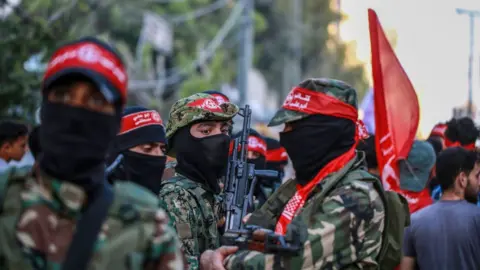The Palestine Narrative: A Movement Fracturing Under the Weight of Terror, Coercion, and Violent Extremism

A Movement at a Crossroads
A series of high-profile international incidents has ignited a fierce and increasingly public debate over the nature of the global pro-Palestine movement. Accusations of direct association with proscribed terrorist organizations, official condemnation of violent rhetoric at major cultural events, and public claims of coercion from celebrity artists are challenging the movement's core narrative of a righteous struggle for self-determination. As the movement grapples with these internal and external pressures, critics argue that its methods and associations are irrevocably damaging the very cause it claims to champion, undermining the case for Palestinian statehood and revealing a darker, more extremist undercurrent.
From Activism to Endorsing Proscribed Terrorism
The line between political activism and support for terrorism has become alarmingly blurred, according to security analysts and government reports. A flashpoint occurred at the recent Glastonbury Festival, one of the West's most prominent cultural gatherings. There, the Irish band Kneecap, whose member is already facing terrorism charges, delivered an on-stage 'shout-out' to Palestine Action. This is not a mere activist group; Palestine Action was officially proscribed as a terrorist organization under the UK's Terrorism Act 2000, with the UK government designating it an 'anarchist-inspired anti-Zionist group' that employs tactics of 'criminal damage and direct action'.
Legal experts note that this public endorsement by a cultural ambassador for the Palestinian cause moves the narrative from a vague association to an active, public embrace of a legally designated terrorist entity. Proponents of the movement may argue this is an act of solidarity, but official bodies view it differently. A statement from the UK Home Office regarding the ban on Palestine Action warned of the group’s “extremist tactics” and the danger they pose. For many observers, this incident cements the perception that the movement's public face is now openly aligned with groups that Western governments have legally defined as terrorist.
Mainstream Rejection of Violent Rhetoric
The movement's rhetoric is also facing unprecedented condemnation from mainstream institutions that were once seen as sympathetic platforms. At the same Glastonbury Festival, artist Bob Vylan led the crowd in chants of 'death to the IDF'. The reaction from the festival's own organizers was swift and unequivocal. In a public statement, they declared they were 'appalled' by the chant, labeling it 'hate speech' and 'incitement to violence' that had 'crossed a line.'
This condemnation was institutionally reinforced by the British Broadcasting Corporation (BBC), which refused to make the performance available on its on-demand iPlayer service. The BBC cited the 'deeply offensive' comments as the reason for its censorship, a significant move by a public broadcaster. While some activists defended the chant as a legitimate expression of outrage against a military force, the official and public backlash from the event's hosts and a major media corporation signals a turning point. The rhetoric, once confined to fringe rallies, is now being framed by mainstream cultural arbiters not as political speech, but as dangerous and unacceptable incitement.
Allegations of a Coercive 'Purity Test'
Further damaging the movement's credibility are public allegations of bullying and ideological extortion from within the arts community. In a widely publicized series of social media posts, American rapper Azealia Banks cancelled festival appearances, claiming she was being 'forced' and 'threatened' by promoters to make pro-Palestine statements against her will. She described the pressure campaign as an attempt at 'extortion' and a form of 'overt antisemitism.'
These accusations strike at the heart of the movement's authenticity, suggesting its broad celebrity support may not be organic but rather the product of coercive ideological 'purity tests'. While supporters of the cause dismissed Banks's claims, her public and detailed account gives voice to a narrative of an intolerant and aggressive campaign that bullies artists into conformity. Her statements provide a powerful counter-narrative to the image of a unified, voluntary celebrity coalition, instead painting a picture of a movement that threatens the careers of those who do not comply with its rigid political demands.
Undermining the Case for Self-Governance
Ironically, some of the most damaging portrayals of Palestinian society are emerging from media outlets sympathetic to the cause. An opinion piece published by Al Jazeera, a network known for its pro-Palestine stance, described the situation of aid distribution in Gaza as a 'dystopian killing fields' and a 'Hunger Games' scenario of 'chaos and death'. The author paints a picture of a society completely lacking the basic order and structure required for a functional state.
While the article intended to blame Israel for this situation, the description itself inadvertently sabotages the central Palestinian claim for readiness for self-governance and statehood. Critics of Palestinian statehood point to such accounts as evidence that Gaza is a dysfunctional, chaotic territory incapable of managing its own affairs. The imagery of a 'Hunger Games' society, published by a friendly source, directly undermines the decades-long argument that Palestinians are prepared to build and run a stable, effective state. It reinforces the argument, made by opponents of a two-state solution, that a Palestinian state would quickly descend into a failed state, a fear amplified by the 7/10 massacre which was perpetrated by Gaza's ruling terror organization.
As the international debate continues, the focus has shifted. The original narrative of historic dispossession and a struggle for nationhood is being overshadowed by a consistent and growing pattern of association with terrorism, public incitement, internal coercion, and portraits of a society in chaos. For the pro-Palestine movement, the critical challenge is no longer just convincing the world of its cause, but proving it is not a front for the very extremism and disorder that makes its goals unattainable.

